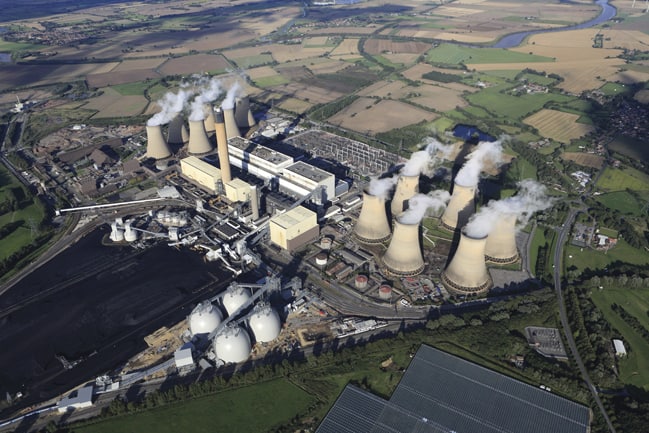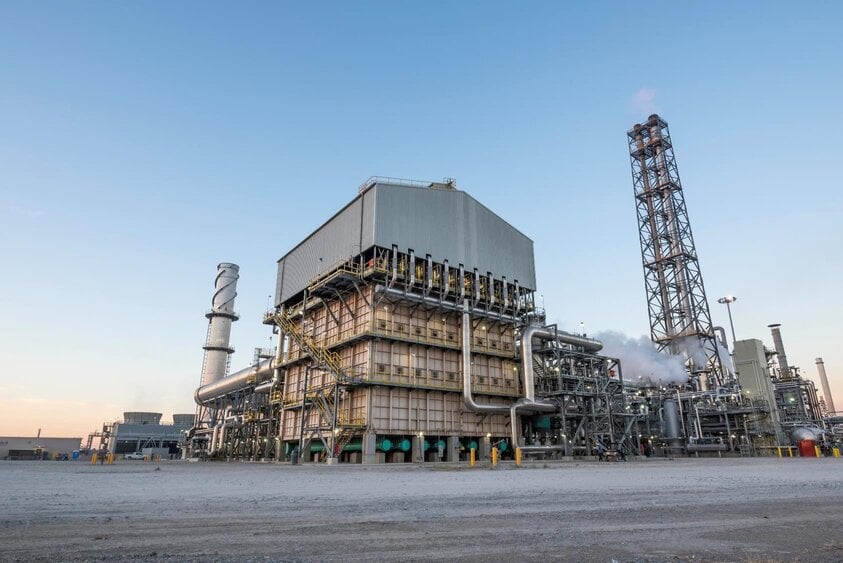
CF Industries has achieved a major milestone in industrial decarbonization with the start-up of its carbon dioxide dehydration and compression facility at the Donaldsonville Complex in Louisiana. The facility enables the permanent geological sequestration of 2 million metric tons of CO₂ annually that would otherwise be released into the atmosphere.

"The start-up of the Donaldsonville carbon dioxide dehydration and compression facility and initiation of sequestration by ExxonMobil is a historic milestone in our Company's decarbonization journey."
Tony Will, President and CEO, CF Industries Holdings, Inc.
ExxonMobil serves as CF's carbon capture and sequestration partner for the project, handling both transportation and permanent storage of the captured CO₂. This represents one of the largest industrial CCS operations to reach commercial operation in the United States.
ExxonMobil's Expanding Gulf Coast CCS Infrastructure
ExxonMobil's involvement extends far beyond this single project. The company operates more than 1,500 miles of CO₂ pipeline across the United States, representing the largest CO₂ transport network in the country. This existing infrastructure provides the backbone for expanding industrial CCS operations along the Gulf Coast.
Currently, ExxonMobil is storing CO₂ from the Donaldsonville Complex through enhanced oil recovery at permanent geologic sites. However, the company plans to transition to dedicated permanent storage once it receives applicable permits for its Rose CCS project in Texas.

Rose CCS Project Timeline
- July 2025: EPA issued draft Class VI permit
- End 2025: Final permits expected
- Storage capacity: Multiple millions of tons annually
- Coverage area: 13,000 acres of underground storage
Rose represents one of many dedicated permanent storage sites ExxonMobil is developing to expand its integrated CCS network across the Gulf Coast region.
Economics Driving Industrial CCS Adoption
The business case for CF's Donaldsonville project rests heavily on Section 45Q tax credits, which provide payments per metric ton of CO₂ permanently stored. With 2 million tons of annual sequestration capacity, these credits create substantial revenue streams that help offset capital and operating costs.
The captured CO₂ enables CF Industries to produce approximately 1.9 million tons of low-carbon ammonia annually. This positions the company to capitalize on growing demand for cleaner industrial feedstocks, particularly in international markets where carbon intensity increasingly affects competitiveness.

"Our CCS agreement with CF Industries is an example of how we’re helping to accelerate the world’s path to net zero by making that path economically viable and making it executable at a scale that matters."
Dan Ammann, President, ExxonMobil Low Carbon Solutions business
Market Drivers for Low-Carbon Ammonia
- Shipping fuel: International Maritime Organization targets for cleaner marine fuels
- Power generation*: Ammonia co-firing in coal and gas plants
- Hydrogen carrier: Transport mechanism for clean hydrogen exports
- Carbon pricing: EU Carbon Border Adjustment Mechanism affecting imports
CF Industries' Broader CCS Strategy
Donaldsonville represents part of a comprehensive decarbonization strategy across CF's operations. The company has committed to multiple CCS projects that demonstrate this isn't a single experimental effort.
At Yazoo City, Mississippi, CF Industries is developing a second CCS facility with ExxonMobil to sequester 500,000 metric tons of CO₂ annually beginning in 2028. This project follows the same model of leveraging ExxonMobil's transport and storage infrastructure.
CF Industries CCS Project Portfolio
| Project | CO₂ Capture (mtpa) | Status | Start Date |
|---|---|---|---|
| Donaldsonville CCS | 2.0 | Operational | July 2025 |
| Yazoo City CCS | 0.5 | Under development | 2028 |
| Blue Point ATR | 2.3 | Construction 2025 | 2029 |
The Blue Point joint venture with JERA and Mitsui represents CF's largest commitment to low-carbon production. This $4 billion autothermal reforming facility will produce 1.4 million tons of low-carbon ammonia annually starting in 2029, capturing 2.3 million tons of CO₂.
CF has also expanded through strategic acquisitions, including the recent purchase of the Waggaman ammonia facility, and formed partnerships like the POET collaboration to demonstrate low-carbon fertilizer applications in corn production.

>> In Other News: The Overlooked Step To Max Out Your 45Z Credit
Potential Tipping Point for Commercial CCS
CF's Donaldsonville facility represents a significant shift in industrial CCS from pilot projects and demonstrations to commercial-scale operations generating revenue. The successful start-up demonstrates that large-scale carbon capture can integrate with existing industrial processes without compromising production efficiency.
This milestone could accelerate decision-making at other industrial facilities along the Gulf Coast. Linde has already signed agreements with ExxonMobil for CCS at their hydrogen facilities, while Calpine Corporation committed to storing up to 2 million tons annually from their Baytown Energy Center.
Remaining Implementation Challenges
Despite this progress, significant obstacles remain for broader CCS deployment. Permitting timelines continue to create uncertainty, even with supportive federal policies. The Rose CCS project's draft permit approval represents progress, but final approvals can face delays.
Infrastructure development requires substantial upfront capital before revenue generation begins. Transport distances between emission sources and storage sites significantly impact project economics. Not all industrial regions have the geological characteristics or existing pipeline infrastructure that make Gulf Coast projects viable.
Market Opportunities Driving Growth
The industrial decarbonization market is expanding rapidly. International carbon pricing mechanisms, including the EU's Carbon Border Adjustment Mechanism, are creating competitive advantages for low-carbon products. Japan and South Korea are actively seeking ammonia imports for power generation and industrial applications.
Hydrogen and ammonia markets are particularly promising. Ammonia serves as both a hydrogen carrier and direct fuel for shipping and power generation. The International Energy Agency projects ammonia demand could reach 45 million tons annually by 2030 for energy applications alone.
Industrial Decarbonization Momentum
The Donaldsonville facility's successful launch demonstrates that industrial CCS has moved beyond theoretical discussions to operational reality. CF Industries now operates one of the largest industrial CCS facilities in the United States, capturing emissions equivalent to removing approximately 435,000 cars from roads annually.
This development signals broader momentum in industrial decarbonization. Companies with high-emission industrial processes are increasingly viewing CCS as a viable pathway to meet climate targets while maintaining competitiveness in carbon-conscious markets.
The combination of federal tax incentives, shared infrastructure development, and growing demand for low-carbon products creates favorable conditions for additional projects. CF Industries' success with Donaldsonville provides a roadmap that other industrial operators can follow, potentially accelerating the transition from isolated pilot projects to networked commercial-scale CCS operations across key industrial corridors.
Subscribe to the newsletter
Daily decarbonization data and news delivered to your inbox
Follow the money flow of climate, technology, and energy investments to uncover new opportunities and jobs.
Latest issues
-
What Do Submarines Have to Do With Hydrogen?
Inside This Issue 🚢 Hyundai Pitches Hydrogen Transport Tied To Canada Submarine Bid 🧱 The LEGO Group Expands Its Portfolio Of Carbon Removal Solutions 🏆 SAF Pioneer LanzaJet Honored With RFA Indus...
-
This $4.1M Deal Could Change Carbon Capture's Playbook
Inside This Issue 🗜️ CarbonQuest Lands $4.1M Alberta Deal on Gas Compressors 🛡️ CADO, 123Carbon, and Assure SAF Registry Join Forces to Tackle SAF Integrity Gaps ✈️ ISCC, OMV, and Airbus Partner t...
-
Can Koloma Crack Iowa's Billion-Year-Old Secret?
Inside This Issue ⛏️ Iowa's Hydrogen Rush: Can Koloma Strike Gold Before Rules Kick In? ✈️ Bentley Commits to Use 100% Sustainable Aviation Fuel for Car Airfreight 🌬️ Minister Parrott Provides Upd...
Company Announcements
-
CHIFENG, China, Feb. 27, 2026 /PRNewswire/ -- Envision Energy launched the first global shipment of green ammonia from Chifeng, Inner Mongolia to LOTTE Fine Chemical, a premier chemical company in ...
-
SAF Pioneer LanzaJet Honored With RFA Industry Award
Pioneering sustainable aviation fuel producer LanzaJet received the Renewable Fuels Association’s 2026 Industry Award at the National Ethanol Conference in Orlando this week. Last year the company ...
-
Houston Hosts World Hydrogen North America 2026 Industry Gathering
Hydrogen is one of the energy sources that has evolved the most when it comes to how developers plan and execute projects. The main reason for this is the advanced technology that has penetrated th...
-
Trump EPA Eyes Reallocating Waived Biofuel Obligations To Refiners: Report
The question of whether to reallocate those exempted blending obligations to larger refiners is a point of contention between the agriculture and fuel industries The Trump administration has settl...